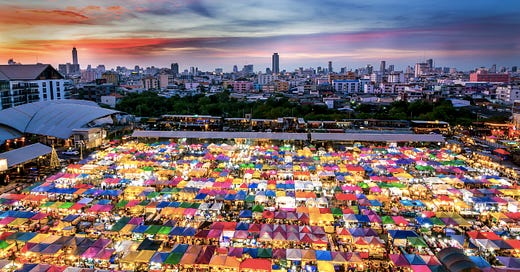Emerging Markets Daily - October 15
Global Inflation Alarm Bells, China Says Evergrande Spillover 'Controllable', Global Shipping Woes, Turkey Opposition and Lira Rout, Whither Africa Tech Giant Jumia?
The Top 5 Stories Shaping Emerging Markets from Global Media - October 15
Inflation Sets off Alarms Around the World
Wall Street Journal
“Rising inflation is triggering anxiety around the world as a surge in demand following the easing of Covid-19 lockdowns has been confronted by supply bottlenecks and rising prices of energy and raw materials.”
“The sharpest consumer-price increases in years in many countries have evoked different responses from central banks. More than a dozen have raised interest rates but two that haven’t are those that loom largest over the global economy: the Federal Reserve and the European Central Bank…”
“For all central bankers, the big worry is that inflation becomes embedded as households start to factor expectations that faster inflation is here to stay into wage bargaining and businesses make the same assumption as they set prices. Where memories of high rates of inflation are fresher than they are in the U.S. and Western Europe, that is a greater risk…”
“‘Emerging markets are turning hawkish because there is a risk of inflation expectations going much higher,’ said Bhanu Baweja, chief strategist at UBS Research. Almost every country in South America has been through a period of very high inflation in living memory, and prices are again surging there following a decline in new coronavirus infections. Without increases in wages to match, many households are in financial peril.”
“Rising food and energy prices have also pushed up inflation across much of sub-Saharan Africa. Ethiopia’s central bank in August raised its rate for lending to commercial banks to 16% from 13% and doubled the cash-reserve ratio requirement for commercial banks to 10%.”
“Elsewhere, governments are resorting to measures that were common during the 1970s, but have since been set aside in most countries. On Wednesday, Argentina’s interior commerce secretary, Roberto Feletti, announced a 90-day price freeze on 1,247 goods in stores amid concerns about rising food prices. ‘We need to stop food prices from eroding salaries,’ he said.” WSJ reports.
China Says Debt-Laden Evergrande Spillover ‘Controllable’
Financial Times
“A People’s Bank of China official has said the spillover of a crisis at Evergrande on the financial system was ‘controllable’, in the central bank’s first official comments on the world’s most indebted developer since it missed international bond payments last month.”
“The statement came as the company faces increasing scrutiny from regulators ahead of a potential default next week, with Hong Kong’s audit watchdog announcing a probe into PwC’s most recent audit of its accounts.”
“Zou Lan, an official at the PBoC, told reporters at a press conference on Friday evening that the Evergrande situation was being resolved by local governments and authorities through ‘market and rule of law principles’, according to state media.”
“The comments represent a significant intervention from Beijing after Evergrande sparked volatility across global markets when it missed an interest payment due on September 23 on one of its dollar-denominated bonds, triggering a 30-day grace period. The company’s rapidly unfolding liquidity crisis has shown signs of spreading across China’s real estate development sector, where the number of defaults is growing, raising concerns over possible fallout for China’s wider economy.” The FT reports.
Global Shipping Set to Get Worse Before it Gets Better
Al Arabiya
“As the shipping industry goes through an unprecedented situation that started in the beginning of the COVID-19 pandemic, things will get worse before they get better, Vice President of global ecommerce at DHL, Nabil Malouli, told Al Arabiya in an interview.”
“An ‘imbalance between supply and demand started to create shipping rates to go higher... and then we saw a sequence of events that has created even a higher situation in terms of like backlog and congestion,’ he said.”
“‘Labor shortage, capacity increase in terms of demand, and also the fact that we have a much lower airfreight capacity across the globe due to the fact that many of the airlines are not operating yet internationally at the level they were operating to pre-pandemic,’ leading to a combination of factors creating an imbalance, Malouli told Al Arabiya.”
“According to the VP, this had led to a much higher demand and supply in the marketplace, which is consequently increasing the rates. People should expect shipping lines and airlines to increase their prices during the month of October, however he expects things to balance out by February or March of 2022.” Al Arabiya reports.
Turkey Opposition to Meet CB Governor Amid Lira Rout
Bloomberg
“The leader of Turkey’s main opposition party said he’ll visit to the central bank on Friday as the lira weakened for a sixth straight day to a new low.”
“‘Today at 3:30 p.m. I will go to the central bank,’ Kemal Kilicdaroglu, head of the Republican People’s Party, said via Twitter. ‘Stop watching this disgrace crushing the nation. Establish a Winter Fund,’ he said, addressing President Recep Tayyip Erdogan.”
“Kilicdaroglu and his economy lieutenants will meet central bank Gov. Sahap Kavcioglu and speak to journalists after the meeting, Kilicdaroglu’s Press Advisor Omer Topsakal said.”
“The Turkish lira slid to a fresh low of 9.2422 per dollar on Friday, taking this year’s decline to more than 19%. The central bank’s newly reshuffled Monetary Policy Committee is set to meet on interest rates on Oct. 21. The bank is expected to cut the benchmark rate by 100 basis points to 17%, according to the median estimate in a Bloomberg survey of 15 analysts.” Bloomberg reports.
Can African Tech Giant Jumia Deliver On Its Promise?
BBC
“It could not have got off to a much better start for Jumia's historic stock market listing. The hoopla on the day it became the first Africa-focussed tech firm to list on the New York Stock Exchange was massive.International media took note and investors piled in, its share price rose more than 70% in value on the day but the excitement would prove to be short-lived…”
“Share prices plummeted and came back, backers had bailed out, and it had withdrawn from trading in three of the fourteen countries it was operating in - and that's not to mention reports of fraud lawsuits in New York courts and a public relations disaster over its identity.”
“But the promise of millions of consumers newly connected to the internet has not gone away and neither has interest in Jumia which is still by far the largest e-commerce company focussed on the African continent - although its management and much of technical expertise is based outside of Africa.”
“By 2030, consumer spending across Africa is expected to reach $2.5tn. Jumia still sells goods in 11 of those countries. It operates a marketplace where thousands of other businesses sell goods on its platform and has a finance arm, Jumia pay, so customers can go about their shopping, pay utility bills and order pizza, all without leaving the Jumia's platforms.”
“A mixture of leaving unprofitable markets and a new interest in e-commerce spurred by the pandemic has seen Jumia's share price return to levels seen on the day of its stock market debut.” Nancy Kacungira reports.
“Oh, come with old Khayyám, and leave the Wise To talk; one thing is certain, that Life flies; One thing is certain, and the Rest is Lies; The Flower that once blown for ever dies.” - The Rubaiyat of Omar Khayyam, from the Edward Fitzgerald translation




